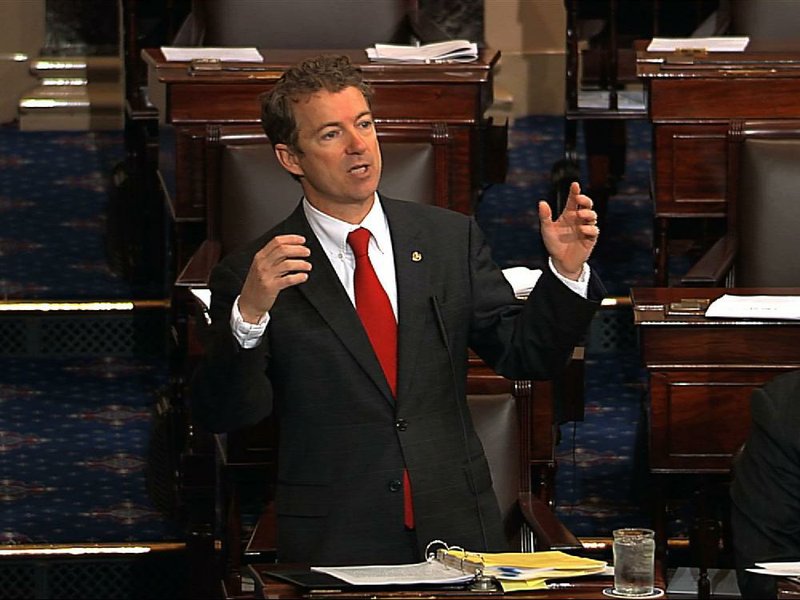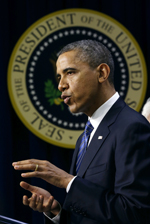WASHINGTON — A Republican critic of the Obama administration’s drone policy mounted a self-described filibuster Wednesday to block Senate confirmation of John Brennan to take over as director of the CIA.
Sen. Rand Paul, R-Ky., took the floor shortly before noon. With intermittent support from other conservatives holding similar views, plus Democratic Sen. Ron Wyden of Oregon, Paul spoke almost continuously for five hours before Majority Leader Harry Reid tried but failed to move to a vote on Brennan.
Paul resumed his oration, snacking on candy at the dinner hour while continuing to speak. At one point, Sen. Mark Kirk, RIll., who walks haltingly with a cane because of a stroke, delivered a canister of hot tea and an apple to Paul’s desk,but a doorkeeper removed them.
Dressed in a dark suit, white shirt and red tie, Paul read from notebooks filled with articles about the expanded use of the unmanned weapons that have become the centerpiece of the Obama administration’s campaign against al-Qaida suspects. As he moved about the Senate floor, aides brought him glasses of water, which he barely touched. Senate rules say a senator has to remain on the floor to continue to hold it, even though they can yield to another senator for a question.
The Kentucky senator, who is the son of former Texas congressman and libertarian leader Ron Paul, offered to cease if President Barack Obama or Attorney General Eric Holder issued a statement assuring that drones would not be usedin the United States to kill terrorism suspects who are U.S. citizens.
Later in the evening Paul offered to allow a vote on Brennan if the Senate would vote on his resolution stating that the use of the unmanned, armed aircraft on U.S. soil against American citizens violates the Constitution. Democrats rejected the offer.
Reid, D-Nev., said he planned to file a motion to bring debate over Brennan’s nomination to an end, if not today, then Friday or next week. Reid had pushed for a confirmation vote Wednesday. Technically, the Senate had not even started the debate on Brennan’s nomination before Paul took control of the floor almost immediately after Republicans successfully blocked a vote on a federal appeals court nominee.
Paul’s speech began at 11:47 a.m. with him declaring, “I will speak until I can no longer speak.” He focused on what he said was the Obama administration’s refusal to rule out the use of drone strikes inside U.S. borders against American citizens. Sens. Mike Lee, R-Utah, Ted Cruz, R-Texas, Jerry Moran, R-Kan., Marco Rubio, R-Fla., and Wyden joined Paul briefly three hoursinto the debate but turned it back to him. Wyden has long pressed for greater oversight of the use of drones.
The record for the longest individual speech on the Senate floor belongs to Strom Thurmond, R-S.C., who filibustered for 24 hours and 18 minutes against the Civil Rights Act of 1957.
Holder came close to making the statement Paul wanted earlier in the day during an exchange with Cruz at a Senate Judiciary Committee hearing, according to Paul.
Cruz asked Holder if the Constitution allowed the federal government to kill a U.S. citizen on U.S. soil who doesn’t pose an imminent threat. Holder said the situation was hypothetical, but that he did not think that in that situation the use of a drone or lethal force would be appropriate. Cruz criticized Holder for not simply saying “no” inresponse.
In a letter sent Tuesday to Paul, Brennan said the CIA does not have authority to conduct lethal operations inside the U.S.
Brennan’s bid to lead the spy agency received a boost when Sen. Lindsey Graham, R-S.C., said Wednesday that he is leaning toward votingfor Brennan after receiving detailed information about the attack last September on the U.S. diplomatic mission in Benghazi, Libya.
Graham, along with Sen. John McCain, R-Ariz., had said they would oppose the nomination on the Senate floor if they didn’t get classified information detailing the Obama administration’s actions immediately after the attack that killed four Americans.
Graham also criticized his GOP colleagues, calling the prospect of drones being used to kill people in the United States “ridiculous.”
“I think it’s paranoia between libertarians and the hard left that is unjustified,” Graham said. “I trust this president and other presidents to exercise commander-in-chief authority in a time of war.”
Rep. Mike Rogers, R-Mich., the chairman of the House Intelligence Committee, echoed Graham. “Any suggestion that the United States would use drone strikes against U.S. citizens in the United States is irresponsible,” Rogers said.
Holder told Paul in a letter Monday that the federal government has not conducted such operations and has no intention of doing so. But Holder also wrote that he supposed it was possible under an “extraordinary circumstance” that the president would have no choice but to authorize the military to use lethal force inside U.S. borders. Holder cited the attacks at Pearl Harbor and on Sept. 11, 2001, as examples.
Information for this article was contributed by Jim Kuhnhenn of The Associated Press.
Front Section, Pages 4 on 03/07/2013

